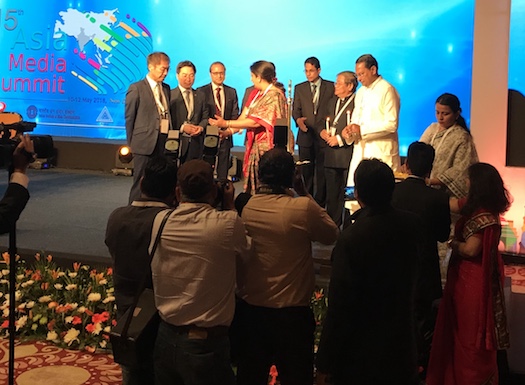The 15th annual Asia Media Summit has opened in New Delhi.
The ancient city of Delhi has a history of over 2000 years and is full of stories, making it the perfect setting for the 2018 conference, with its theme of storytelling. Many speakers mentioned this theme in their opening remarks.
The conference has 228 foreign delegates from 39 countries attending.
Director of the New Delhi UNESCO office Shigeru Aoyagi said:
“This is a dangerous time of misinterpretations and manipulation of news and information. The media landscape is changing to a great extent, the world is full of stories, but some of them are untrue or frivolous. Media has a great responsibility for telling stories in a positive and constructive way.”
In his keynote speech, Sh Vineet Jain, Managing Director of India’s Times Group, urged the Indian Government to improve media regulation. He said successful media companies no longer think about print or television, they just think of the audience, and urged the government of India to improve media regulations (more details of his speech here).
Hasanul Haq Inu (pictured above), the Information Minister for Bangladesh remembered past wars in his country and said his country is now fighting a new war, “a difficult war against cyber criminals and terrorists” who are waging an information war in the world today.
“No media is free from attack, we must work together to fight this terrorism.”
The Cambodia Information Minister Khieu Kanharith spoke about his country’s recent tragedies, saying the lack of a free press was one of the reasons that leaders were able to get away with murders and genocide. “There was no free press and no way for people to speak out against the atrocities,” he said.
The country has now established free media to ensure that all people can speak freely. It has encouraged “a boom in media,” with 140 radio stations and 30 tv stations now part of the ecosystem. The Minister believes a free press in Cambodia will prevent future abuses of power.
“A pressing need in Cambodia is now the need for quality journalism training for all the media in his country… Access to Information and quality journalism are two of our current needs as we improve the media in our country,” said the Minister.
IRIB Iran is currently Director of the AIBD General Conference. IRIB’s Abbas Naseri Taheri welcomed guests and asked for “swift and innovative solutions” to the problems facing media today. Outlining three key areas for action, he said:
“Citizen journalists, social media and small media businesses produce content with considerable speed and seek to attract more people to their platforms. The internet has facilitated this trend. Broadcasters should adopt an innovative approach to avoid falling behind our new rivals. This will require investment…
“We need to understand the benefits of the new technology and the way they can deliver our content to people…
“There is the need for organising and managing the production and distribution of radio and tv content in cyber space. The issue of enforcing regulations in cyber space is also important… These are challenges and opportunities in this new environment that is opening a new chapter in the modern media era.”
Delivering the keynote address, Broadcasting Minister Smriti Zubin Irani said the Indian Government supports the media industry and has encouraged growth, particularly in radio, where there are 323 new channels and 683 more in the pipeline (more details of her speech here and a counter viewpoint about community radio here).
View the whole session below.

